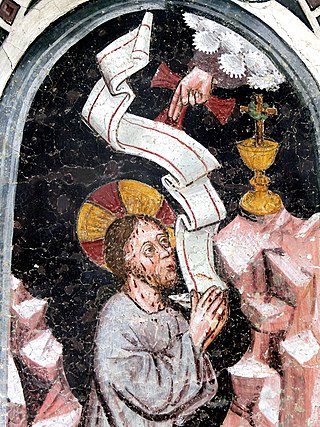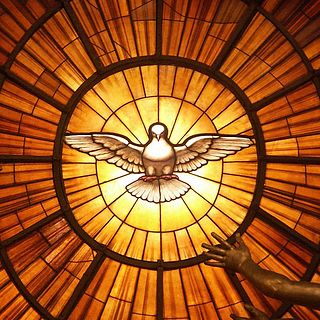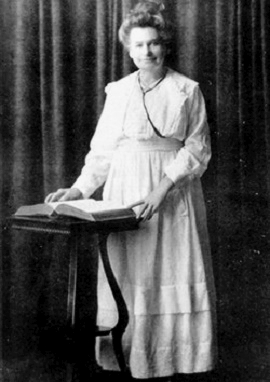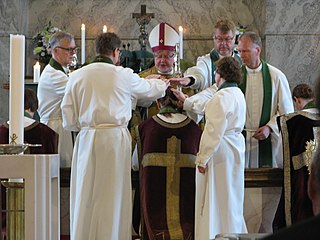Related Research Articles
Speaking in tongues, also known as glossolalia, is an activity or practice in which people utter words or speech-like sounds, often thought by believers to be languages unknown to the speaker. One definition used by linguists is the fluid vocalizing of speech-like syllables that lack any readily comprehensible meaning. In some cases, as part of religious practice, some believe it to be a divine language unknown to the speaker. Glossolalia is practiced in Pentecostal and charismatic Christianity, as well as in other religions.
Pentecostalism or classical Pentecostalism is a Protestant Charismatic Christian movement that emphasizes direct personal experience of God through baptism with the Holy Spirit. The term Pentecostal is derived from Pentecost, an event that commemorates the descent of the Holy Spirit upon the Apostles and other followers of Jesus Christ while they were in Jerusalem celebrating the Feast of Weeks, as described in the Acts of the Apostles.

A spiritual gift or charism is an extraordinary power given by the Holy Spirit. These are believed by followers to be supernatural graces that individual Christians need to fulfill the mission of the Church. In the narrowest sense, it is a theological term for the extraordinary graces given to individual Christians for the good of others and is distinguished from the graces given for personal sanctification, such as the Seven Gifts of the Holy Spirit and the fruit of the Holy Spirit.

The International Pentecostal Holiness Church (IPHC) or simply Pentecostal Holiness Church (PHC) is an international Holiness-Pentecostal Christian denomination founded in 1911 with the merger of two older denominations. Historically centered in the Southeastern United States, particularly the Carolinas and Georgia, the Pentecostal Holiness Church now has an international presence. In 2000, the church reported a worldwide membership of over one million—over three million including affiliates.
The charismatic movement in Christianity is a movement within established or mainstream denominations to adopt beliefs and practices of Charismatic Christianity, with an emphasis on baptism with the Holy Spirit, and the use of spiritual gifts (charismata). It has affected most denominations in the United States, and has spread widely across the world.

John Richard Wimber was an American pastor, Christian author and musician. Initially ordained as a Quaker minister, he became an early, pioneering pastor of charismatic congregations, and a popular thought leader in modern Christian publications on the third person of the Christian Trinity, the Holy Spirit, and the Holy Spirit's action in modern churches through miraculous phenomena referred to as miracles, or signs and wonders. Wimber was a founding leader of the Vineyard Movement, a Christian movement that Kenn Gulliksen began in the United States and that later became a wider denomination.
In Christian theology, baptism with the Holy Spirit, also called baptism in the Holy Spirit or baptism in the Holy Ghost, has been interpreted by different Christian denominations and traditions in a variety of ways due to differences in the doctrines of salvation and ecclesiology. It is frequently associated with incorporation into the Christian Church, the bestowal of spiritual gifts, and empowerment for Christian ministry. Spirit baptism has been variously defined as part of the sacraments of initiation into the church, as being synonymous with regeneration, or as being synonymous with Christian perfection. The term baptism with the Holy Spirit originates in the New Testament, and all Christian traditions accept it as a theological concept.
The Latter Rain, also known as the New Order or the New Order of the Latter Rain, was a post-World War II movement within Pentecostal Christianity which remains controversial. The movement saw itself as a continuation of the restorationism of early Pentecostalism. The movement began with major revivals between 1948 and 1952 and became established as a large semi-organized movement by 1952. It continued into the 1960s. The movement had a profound impact on subsequent movements as its participants dispersed throughout the broader charismatic and Pentecostal movements beginning in the 1960s.
Signs and wonders refers to experiences that are perceived to be miraculous as being normative in the modern Christian experience, and is a phrase associated with groups that are a part of modern charismatic movements and Pentecostalism. This phrase is seen multiple times throughout the Bible to describe the activities of the early church, and is historically recorded as continuing, at least in practice, since the time of Christ. The phrase is primarily derived from Old and New Testament references and is now used in the Christian and mainstream press and in scholarly religious discourse to communicate a strong emphasis on recognizing perceived manifestations of the Holy Spirit in the contemporary lives of Christian believers. It also communicates a focus on the expectation that divine action would be experienced in the individual and corporate life of the modern Christian church, and a further insistence that followers actively seek the "gifts of the Spirit".
In Christianity, the word of wisdom is a spiritual gift listed in 1 Corinthians 12:8. The function that this gift is given varies. Some Christians see in this gift a prophetic-like function. Others see in the word of wisdom a teaching function. This gift is closely related with the gift of the word of knowledge.

The Catholic Charismatic Renewal (CCR) is a movement within the Catholic Church that is part of the wider charismatic movement across historic Christian churches.
The Neo-charismaticmovement is a movement within evangelical Protestant Christianity that is composed of a diverse range of independent churches and organizations that emphasize the current availability of gifts of the Holy Spirit, such as speaking in tongues and faith healing. The Neo-charismatic movement is considered to be the "third wave" of the Charismatic Christian tradition which began with Pentecostalism, and was furthered by the Charismatic movement. As a result of the growth of postdenominational and independent charismatic groups, Neo-charismatics are now believed to be more numerous than the first and second wave categories. As of 2002, some 19,000 denominations or groups, with approximately 295 million individual adherents, were identified as Neo-charismatic.

Maria Beulah Woodworth-Etter was an American healing evangelist. Her ministry style was a model for Pentecostalism and the later Charismatic movement, earning her the title "Mother of Pentecost" in some circles.
In Christian theology, the gift of miracles is among the spiritual gifts (charismata) mentioned by St. Paul in his First Epistle to the Corinthians. As a charism, the gift is imparted to certain individuals through the power of the Holy Spirit.

The Assemblies of God USA (AG), officially The General Council of the Assemblies of God, is a Pentecostal Christian denomination in the United States and the U.S. branch of the World Assemblies of God Fellowship, the world's largest Pentecostal body. The AG reported 2.9 million adherents in 2022. In 2011, it was the ninth largest Christian denomination and the second largest Pentecostal denomination in the United States. The Assemblies of God is a Finished Work denomination, and it holds to a conservative, evangelical and classical Arminian theology as expressed in the Statement of Fundamental Truths and position papers, which emphasize such core Pentecostal doctrines as the baptism in the Holy Spirit, speaking in tongues, divine healing and the Second Coming of Jesus Christ.
Practical charismatic theology is a subset of Christian theology that teaches how to practically apply charismatic Christian theology in the everyday life of a believer. Theology is the study of the nature of God and religious beliefs. Practical charismatic theology takes this a step further through the incorporation of these beliefs into an individual believer's lifestyle. Practical charismatic theology specifically focuses on incorporating charismatic Christian beliefs into an individual lifestyle with the goal of achieving what Jesus instructed his followers to pray for; "on earth as it is in heaven." Applying theology in this way has been reported as bringing about transformative changes in people's lives, faith healing as a result of prayer, and dramatic changes in entire communities.
Finished Work Pentecostalism is a major branch of Pentecostalism that holds that after conversion, the converted Christian progressively grows in grace. On the other hand, the other branch of Pentecostalism—Holiness Pentecostalism teaches the Wesleyan doctrine of entire sanctification as an instantaneous, definite second work of grace, which is a necessary prerequisite to receive the baptism in the Holy Spirit. Finished Work Pentecostals are generally known to have retained the doctrine of progressive sanctification from their earlier Reformed roots, while Holiness Pentecostals retained their doctrine of entire sanctification from their earlier Wesleyan roots. William Howard Durham is considered to be the founder of Finished Work Pentecostalism.

Cessationism versus continuationism involves a Christian theological dispute as to whether spiritual gifts remain available to the church, or whether their operation ceased with the apostolic age of the church. The cessationist doctrine arose in the Reformed theology: initially in response to claims of Roman Catholic miracles. Modern discussions focus more on the use of spiritual gifts in the Pentecostal and Charismatic movements, though this emphasis has been taught in traditions that arose earlier, such as Methodism.

In Christianity, the laying on of hands is both a symbolic and formal method of invoking the Holy Spirit primarily during baptisms and confirmations, healing services, blessings, and ordination of priests, ministers, elders, deacons, and other church officers, along with a variety of other church sacraments and holy ceremonies.
Charismatic Christianity is a form of Christianity that emphasizes the work of the Holy Spirit and spiritual gifts as an everyday part of a believer's life. It has a global presence in the Christian community. Practitioners are often called charismatic Christians or renewalists. Although there is considerable overlap, charismatic Christianity is often categorized into three separate groups: Pentecostalism, the Charismatic movement, and the neo-charismatic movement.
References
- ↑ Wilhelm, Joseph (1908). "Charismata". The Catholic Encyclopedia. Vol. III. Robert Appleton Company. Retrieved 6 July 2010.
- 1 2 3 4 Guy P. Duffield and Nathaniel M. Van Cleave, Foundations of Pentecostal Theology, 1983, (Los Angeles: Foursquare Media, 2008), p. 337.
- ↑ Gee, Donald. Concerning Spiritual Gifts. Springfield, Missouri: Gospel Publishing House. ISBN 0-88243-486-1. Page 51.
- ↑ Gee, Concerning Spiritual Gifts, 52.
